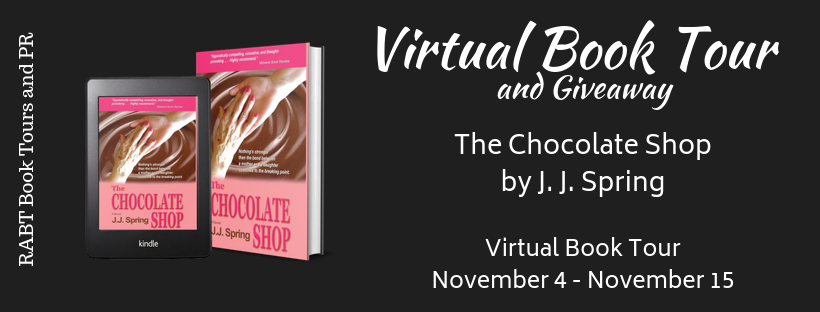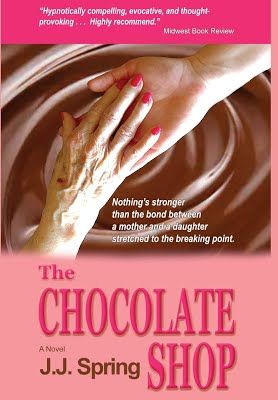Women's Fiction
Date Published: June 2019
Publisher: Riverpoint Press
Laura Beckman’s comfortable suburban life would be perfect but for her daughter. Four years earlier, Brooke abandoned her husband and her own young daughter to run off with a musician. Now back home with her tail between her legs, Brooke’s self-loathing boils over in the face of her mother’s unrelenting condemnation.
Laura’s world is turned upside down after witnessing the long, painful death of her husband. In the search for a better version of herself, she creates the Chocolate Shop which grants terminally ill patients one last wish (e.g returning to the Rockette stage, having sex one last time, even skydiving). Laura then lovingly helps her clients slip away to a peaceful death. Laura must dodge the police who suspect she's committing second-degree murder, and an ex-wife of a client consumed with collecting on an insurance policy. Her relationship with her daughter flips as Brooke becomes the one doing the condemning: “I may have made many mistakes in my life but there’s one thing I can say. I never murdered anybody.”
As Laura comes to grips with the ethical, moral, and legal dimensions of what she's doing, she worries that her strained relationship with her daughter will never be repaired and wonders whether she can ever find love again. She meets Arlo Massey--brash, flamboyant, someone who couldn't care less about what other people think--the complete opposite of the always appropriate Laura Beckman. Arlo disrupts Laura's already tumultuous life. She finds him despicable.
And yet . . .
Excerpt:
Chapter
One
June
Laura wanted Mickey to die.
Tonight.
Now.
She had it all planned. They’d relax on the sofa in
front of a roaring fire, watching the flames dance and crackle, snuggling together
under her grandmother’s time-softened green and white patch quilt. The red wine
stain on the quilt from New Years Eve when they’d made love on the same sofa
had faded away and almost disappeared.
And now her husband was about to fade away and
disappear.
She would take his hand, mercilessly scabbed by needles
searching for a vein, and entwine her fingers through his. Their interlocked
hands would act as one and empty the medicine vial of tiny white pills into the
glass of Chivas, his favorite. They’d enjoy their last hour together, her head
nestling into the hollow space where his neck met his shoulder. She always
considered that spot her private property. She would breath in his scent, and
if she remained still she’d be able to feel his heartbeat tickling her cheek.
Then a final toast. He would drink the whiskey from his
favorite cocktail glass, the one with the etched Orioles logo. They’d reminisce
using the shorthand developed by every husband and wife over decades of
marriage.
Remember when . . .?
He’d become sleepy. She would gently rub his neck right
behind his ear . . .
Then a lingering last kiss.
Goodbye my darl—
“Mother?”
Laura’s
eyes sprang open. Had she dozed off? She glanced at Mickey asleep in the narrow hospital bed squeezed next to her chair.
With so many twisting tubes and wires connected to his shriveled body he more
resembled a monster from an old black and white horror flick than her husband.
“You
were mumbling in your sleep,” Brooke said. “Something about white pills and the
Orioles.” Without looking up from her phone she rotated her hips in an
unsuccessful attempt
to find comfort in the battered gunmetal chair.
What
was her daughter talking about?
“Maybe
you should go home and get some sleep,” Gracie said. “I can stay with him for a
while.”
“Sleep’s
overrated.” She yawned, and her eyes caught the old Baltimore Orioles baseball
pennant hanging over the hospital bed. Orioles
logo . . . whiskey glass . . . white pills . . . Her dream flashed before
her eyes.
“You
okay?” Gracie asked.
White pills . . .
She gasped. Oh my God. She could not, she would not permit her mind to visit
that awful place ever again.
Gracie
pressed. “Laura?”
“Yes,
yes, I’m fine.”
Her
aunt responded with a skeptical expression, then hoisted a pink tote bag to her
lap. Short and wiry in stature, Gracie colored her hair red and wore it below
her shoulders in a wavy style more suited to a young starlet from the forties
than a woman of seventy. A Kurt Vonnegut quote in green script decorated the
side of her bag: “Tis better to have
loved and lust, than to let our apparatus rust.” Laura shook her head
and took a deep breath. The thick, stifling hospital air smelled of must, of
decay. Of death.
For
the millionth time she wondered why God would spare the evil people of the
world—serial killers and terrorists and child molesters—while the good man
lying next to her faced certain death?
Mickey
moaned again. Eight months earlier he’d been diagnosed with “distant”
esophageal cancer, meaning the cancer had spread away from the
tumor to his lymph nodes and organs. The cancer had been hiding there for some time,
undetected, slowly eating
away, bite by tiny bite.
At
first it had been hard to think the words—my
husband’s dying— much less say them. Now, after witnessing him wither away
for the past many months, the vocabulary of death came easily. Hope arrived
early but departed long ago leaving her with the heartbreak of seeing the man
she loved suffer the quiet torture of a lingering death.
About the Author
J. J. Spring is a pseudonym for a successful author who writes in another genre. J. J. lives in Florida with a spouse and a rambunctious poodle named Handsome Jack.
Contact Links
Purchase Links













